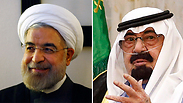
Gaza conflict redraws Mideast alliances
Shifting powers render newfound cooperation with moderate Sunnis possible; 'conflict is pitting Qatar, Turkey and Iran against Egypt and Saudi Arabia,' says expert.
What do Israel, Egypt, Jordan, Saudi Arabia, Bahrain and Kuwait all have in common? They see the Islamist Hamas movement as the biggest danger to regionl stability, and have allied themselves, as least tacitly, with Israel.
While the public in many Arab countries is angry about the loss of life and growing humanitarian crisis in the Gaza Strip, their governments are demonstrating that their revulsion of Hamas is stronger than their dislike of Israel.
Jordan is a good example. More than half of Jordan’s population is Palestinian, and it shares a long border with Israel.
Over the weekend, thousands of Jordanians took to the streets to protest what they called the Israeli aggression against Gaza. Some of the protestors are affiliated with the Muslim Brotherhood, the religious-political association that spawned Egypt’s previous leader, Mohamed Morsi, as well as Hamas.
Some of the protestors called on Jordan to recall its ambassador to Israel, even to cut-off ties with the Jewish state. That, however, seems unlikely.
“The government is concerned that the demonstrations could escalate and eventually lead to destabilization,” Khaled Shorman, of the Masar Center, a Jordanian NGO focusing on youth. “There is sentiment in the street, but the Jordanian government realizes that cutting ties with Israel is not in anyone’s interest.”
The new Egyptian government of President Abdel Fatteh Al-Sisi sees the Muslim Brotherhood, and by extension Hamas, as a serious threat. Sisi has outlawed the Islamist group in Egypt, jailed former President Mohamed Morsi, and issued death sentences against hundreds of Brotherhood supporters. Egypt and Israel also control the two exits into and out of Gaza.
Israel is currently focusing on destroying a series of tunnels that led from Gaza into Israel and could be used for terrorist attacks. Egypt has destroyed hundreds of tunnels that were used for smuggling goods and weapons into Gaza. Israel and Egypt are also cooperating on the threat of Jihadist forces from the Sinai Peninsula.
The fighting has also caused sharp divisions among countries in the Gulf. Qatar has been a lone voice and principal contributor supporting Hamas, donating hundreds of millions of dollars for the reconstruction of Gaza and according to some, for weapons as well.
“The conflict is pitting Qatar, Turkey and Iran against Egypt and Saudi Arabia,” Dr. Theodore Karasik, the director of Research and Consultancy at the Institute for Near East and Gulf Military Analysis (INEGMA) in the United Arab Emirates told The Media Line. “Qatar’s policy is to try to negotiate solutions to regional conflicts – not only in Gaza, but in Sudan and Somalia as well.”
However, Saudi Arabia and other Gulf countries including Kuwait and Bahrain have reacted angrily to Qatar’s support for Hamas. Karasik says the divisions within the Gulf Cooperation Council (GCC) are making it impossible to focus on another threat that could come from an Iranian nuclear program.
The hostilities with Israel come as Hamas was struggling financially and politically. Hamas had lost its main backer, Iran, which has been too busy propping up the Alawite regime of President Bashar Assad in Syria to give support to the Sunni Hamas.
One theory is that Hamas provoked this current conflict with Israel in a desperate attempt to force Israel and Egypt to open Gaza’s borders and get money flowing into Gaza. An estimated 44,000 Hamas civil servants were not been their June salaries after Israel blocked Qatar’s attempts to pay them.
Some Israeli analysts say that once the shooting stops there are new opportunities for a moderate coalition including Israel, Egypt, Jordan, Saudi Arabia and most Gulf states. Yet Israeli officials caution that diplomatic realities will interfere.
“Most of these countries you mention will die before they acknowledge they have any common interest with Israel,” a senior Israeli official told The Media Line. “They will cooperate with Israel on the ground and in projects that are important to them, but most of the time we’ll hear official statements that are harsh and anything but friendly.”
He said that even with Egypt and Jordan, which have peace treaties with Israel, there is little open cooperation.
“We have a huge common interest in regional stability and terror groups like Hamas are a common enemy,” he said. “But this will never be spoken aloud. They will cooperate with us on specific issues when the need arises but it will be behind a curtain of official silence.”
Article written by Linda Gradstein
Reprinted with permission from The Media Line










